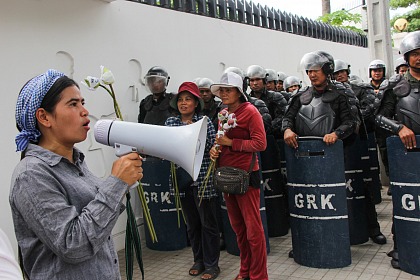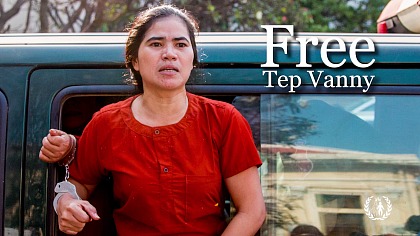Free Tep Vanny: Two Years Too Long
Published on 14 August 2018Prominent land right activist Tep Vanny has been at the forefront of her community’s fight against forced evictions and rights violations in Phnom Penh’s Boeung Kak Lake neighbourhood. Her dogged determination has made her a powerful advocate for justice, not only for the upheaval faced by her own community but for all Cambodians.
Cambodian authorities shut down Vanny’s activism two years ago and have kept her behind bars since then on a series of trumped-up charges and convictions in trials devoid of any credible evidence. She is serving a two-and-a-half-year sentence at Phnom Penh’s infamous Prey Sar prison, also known as Correctional Center 2 (CC2).
My mind is still strong. I’m hungry for justice. I’m hungry for peace.
In August 2016 she was arrested during a peaceful demonstration calling for the release of jailed human rights defenders. She was hit with a series of long-dormant criminal charges – notably for allegedly inciting violence during a 2013 land rights protest.
This is Vanny’s third stint in prison since 2011 but her first time incarcerated without fellow activists. She has spent 730 days behind bars and remained isolated from the tumultuous events of a sweeping government crackdown against all forms of dissent. But, glimpses of her fierce activism are never too far.
“My mind is still strong. I’m hungry for justice. I’m hungry for peace,” she said. “If I don’t get peace or justice – that motivates me to carry on. I don’t care about myself (being) in prison.”
Eviction
Vanny moved with her family from Kampong Speu to Phnom Penh in 2008 in search of a better life and found a new home on the edge of the capital city’s largest lake: Boeung Kak. The lake was the heart of a community and a natural source of livelihood for the 4,000 families living on its shores.
The idyllic settings of Boeung Kak Lake changed in 2007 when the Cambodian government leased the lake and its surroundings to a company owned by ruling party Senator Lao Meng Khin.
The government netted $79 million for the lease. The 4,000 families were never consulted and no environmental impact assessment took place. With no warning, the development firm started to fill the lake, preparing it for a new residential and business city center.
The lake’s residents, including Vanny, witnessed their homes being destroyed by bulldozers with people still living inside – or flooded with displaced mud and lake water.
Women at the Forefront
If we don’t protest, we will lose everything - the future of our children, our land, everything.
Tep Vanny was propelled into activism by the local authority’s refusal to offer reasonable compensation or relocation options to Boeung Kak Lake residents. Having already experienced her family’s land being seized by a sugar tycoon in Kampong Speu province, she was determined that it would not happen again.
“If we don’t protest, we will lose everything: the future of our children, our land, everything,” she said.
Vanny spent the next ten years organizing, protesting and petitioning alongside her community to demand fair compensation. Women were consistently at the forefront of the movement. Young and old, the women of Boeung Kak Lake headed marches, delivered petitions to government ministries and raised banners and lotus flowers – a symbol of peace and Buddhism – in the face of routinely violent security forces.
Vanny’s activism came up against the might of the state on multiple occasions.
On 24 May 2012, Vanny and her fellow community members were arrested and convicted of occupying their land illegally. Those detained, all women, became known as the Boeung Kak 13. After initially being sentenced to a two and half year prison term, the 13 were released following an Appeal Court ruling.
Less than a year later, Vanny travelled to Washington D.C. to accept the Global Voices Award which raised her profile as an internationally recognised human rights defender.
Targeted by Authorities
Buoyed up by these small victories, Vanny began to protest on others’ behalf. When four human rights NGO officers and an election official were arbitrarily detained Vanny joined with others in the so-called “Black Monday” protests to campaign for their release.
If anyone is in trouble my daughter will support them for justice. She is so brave.
Each Monday, various groups protested peacefully while wearing the color black as a sign of united resistance – until Prime Minister Hun Sen responded with a ban on any protests in which participants dressed in the same colour.
Sy Heap, Vanny’s mother, attests her daughter’s fierce spirit.
“If anyone is in trouble my daughter will support them to get justice. She is so brave,” she says. “My daughter cannot be bought. She stands firm and would not give up.”
It was during one of these protests that Vanny’s two year-ordeal began. On 15th August 2016, the night of her arrest, Vanny and the Boeung Kak Lake community were conducting a cursing ceremony, a form of peaceful protest. Women of all ages scattered salt and chili while shouting curses at life-sized puppets meant to represent public officials and institutions.
Para-police barreled onto the scene, pushing through the crowd, heading straight for Vanny. Other participants were ignored or pushed aside while Vanny and Bo Sophea, a fellow activist, were seized, shoved into a car, and taken away.
While Sophea was released after serving a six-day sentence, Vanny saw a flurry of dormant charges slapped against her, resulting in the 30-month sentence she is currently serving and another six-month sentence that has yet to be enforced.
At the same time, the Cambodian government stepped up its rhetoric about a so-called “colour revolution”, claiming that civil society groups and the main opposition party planned to topple the government with foreign assistance, notably from the US. The Black Monday protests were held up by the authorities as proof.
But Vanny’s aim had never been revolution. “I support being quiet – we want to show the world we are non-violent,” she says. "We are the peaceful people, not the colour revolution.”
The Price of Activism
Activism comes at no small cost to women in Cambodia. When they forego paid work for activism, their families suffer as they less able to pay for food or school fees. And there are added interpersonal problems. Many women activists report that their husbands become violent or step up existing domestic violence when they begin campaigning, in some cases leading to divorce and the social stigma that comes with it.
At the same time, the human rights landscape Vanny played an active part of in 2016 has dramatically deteriorated in just two years. A slew of oppressive new laws and amendments to the constitution have been passed in the National Assembly, major independent newspapers and radio stations have been silenced or shut down, the political opposition dissolved and its leader charged with treason.
Despite the hardship Tep Vanny has endured and the worsening situation outside her prison walls, she says that she will continue her activism when released from jail.
MP3 format: Listen to audio version in Khmer
- Related Material









